Monomers - Study guides, Class notes & Summaries
Looking for the best study guides, study notes and summaries about Monomers? On this page you'll find 2903 study documents about Monomers.
All 2.903 results
Sort by
 Popular
Popular
-
BLG1501 Assignment 2 Semester 1 2024 (Solutions)
- Other • 16 pages • 2024
-
- $2.85
- 2x sold
- + learn more
BLG1501 Assignment 2 Semester 1 2024 (Solutions) Question 1 Not yet answered Marked out of 2.00 Flag question Question text Hydrolysis is reaction which occurs when Select one: a. a bond of a polymer is broken down through the addition of water molecule. b. two molecules are covalently bonded to each other through the loss of water. c. a double bond is formed between two atoms. d. a triple bond is formed between two atoms. Clear my choice Question 2 Not yet answered Marked o...
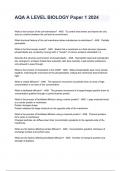 Popular
Popular
-
AQA A LEVEL BIOLOGY Paper 1 2024
- Exam (elaborations) • 13 pages • 2024 Popular
-
- $7.99
- 1x sold
- + learn more
AQA A LEVEL BIOLOGY Paper 1 2024 What is the function of the cell membrane? - ANS To control what enters and leaves the cell, acts as a barrier between the cell and its environment. What structural feature of the cell membrane allows substances to enter/leave? - ANS Partially permeable What is the fluid mosaic model? - ANS States that a membrane is a fluid structure (because phospholipids are constantly moving) with a "mosaic" of various proteins embedded in it Describe the...
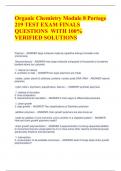
-
Organic Chemistry Module 8 Portage 219 TEST EXAM FINALS QUESTIONS WITH 100% VERIFIED SOLUTIONS
- Exam (elaborations) • 15 pages • 2023
- Available in package deal
-
- $10.99
- 12x sold
- + learn more
Organic Chemistry Module 8 Portage 219 TEST EXAM FINALS QUESTIONS WITH 100% VERIFIED SOLUTIONS Polymer - ANSWER large molecule made by repetitive linking of smaller units (monomers) Macromolecule - ANSWER very large molecule composed of thousands of covalently bonded atoms (ex: polymer) 1. natural (in nature) 2. synthetic (in lab) - ANSWER two ways polymers are made rubber, carbs: starch & cellulose, proteins, nucleic acids DNA, RNA - ANSWER natural polymers nylon, teflon, sty...
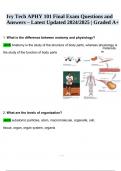
-
Ivy Tech APHY 101 Final Exam Questions and Answers – Latest Updated 2024/2025 | Graded A+
- Exam (elaborations) • 53 pages • 2024
- Available in package deal
-
- $16.49
- 1x sold
- + learn more
What is the difference between anatomy and physiology? ANS Anatomy is the study of the structure of body parts, whereas physiology is the study of the function of body parts 2. What are the levels of organization? ANS subatomic particles, atom, macromolecule, organelle, cell, tissue, organ, organ system, organis Ivy Tech APHY 101 Final Exam Questions and Answers – Latest Updated 2024/2025 | Graded A+ 2 / 17 3. What are the requirements of life? ANS Water, food, oxygen, heat, pressure...
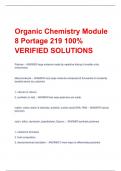
-
Organic Chemistry Module 8 Portage 219 100% VERIFIED SOLUTIONS
- Exam (elaborations) • 15 pages • 2023
-
- $10.99
- 4x sold
- + learn more
Organic Chemistry Module 8 Portage 219 100% VERIFIED SOLUTIONS Polymer - ANSWER large molecule made by repetitive linking of smaller units (monomers) Macromolecule - ANSWER very large molecule composed of thousands of covalently bonded atoms (ex: polymer) 1. natural (in nature) 2. synthetic (in lab) - ANSWER two ways polymers are made rubber, carbs: starch & cellulose, proteins, nucleic acids DNA, RNA - ANSWER natural polymers nylon, teflon, styrofoam, polyethylene, Dacron, - AN...
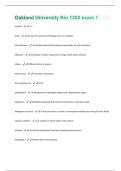
-
Oakland University Bio 1200 exam 1 Question with 100 % correct answers | Verified
- Exam (elaborations) • 14 pages • 2024
- Available in package deal
-
- $7.99
- 1x sold
- + learn more
Acid PH - 1-7 Acids - Increase the amount of hydrogen ions in a solution Actin filament - twisted protein fibers that are responsible for cell movement Adhesion - the ability of water molecules to cling to other polar surfaces Alleles - Different forms of a gene Amino acids - monomers of proteins Amino groups are - polar amphipathic - having both a hydrophilic region and a hydrophobic region Anabolism - Metabolic pathways that construct molecules, requiring energy. Analogous structure -...
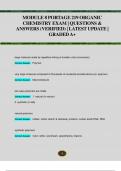
-
MODULE 8 PORTAGE 219 ORGANIC CHEMISTRY EXAM | QUESTIONS & ANSWERS (VERIFIED) | LATEST UPDATE | GRADED A+
- Exam (elaborations) • 21 pages • 2024
-
- $14.49
- 1x sold
- + learn more
1 MODULE 8 PORTAGE 219 ORGANIC CHEMISTRY EXAM | QUESTIONS & ANSWERS (VERIFIED) | LATEST UPDATE | GRADED A+ large molecule made by repetitive linking of smaller units (monomers) Correct Answer: Polymer very large molecule composed of thousands of covalently bonded atoms (ex: polymer) Correct Answer: Macromolecule two ways polymers are made Correct Answer: 1. natural (in nature) 2. synthetic (in lab) natural polymers Correct Answer: rubber, carbs: starch & cellulose, proteins, nu...

-
Edexcel a level biology question paper 3 june 2023 + mark scheme
- Exam (elaborations) • 84 pages • 2023
- Available in package deal
-
- $12.99
- 2x sold
- + learn more
Mark Scheme (Results) Summer 2023 Pearson Edexcel GCE In Biology (9BIO) Paper 3: General and Practical Principles in BiologyEdexcel and BTEC Qualifications Edexcel and BTEC qualifications are awarded by Pearson, the UK’s largest awarding body. We provide a wide range of qualifications including academic, vocational, occupational and specific programmes for employers. For further information visit our qualifications websites at or . Alternatively, you can get in touch with us using th...
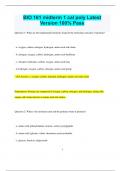
-
BIO 161 midterm 1 cal poly Latest Version 100% Pass
- Exam (elaborations) • 9 pages • 2024
- Available in package deal
-
- $9.99
- 1x sold
- + learn more
BIO 161 midterm 1 cal poly Latest Version 100% Pass Question 1: What are the fundamental elements found in the molecular structure of proteins? - a. oxygen, carbon, nitrogen, hydrogen, amino acid side chain - b. nitrogen, oxygen, carbon, hydrogen, amino acid backbone - c. nitrogen, hydrogen, carbon, oxygen, amino acid ring - d. hydrogen, oxygen, carbon, nitrogen, amino acid group - Answer: a. oxygen, carbon, nitrogen, hydrogen, amino acid side chain Explanation: Proteins are com...
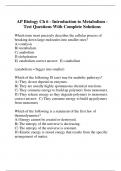
-
AP Biology Ch 6 - Introduction to Metabolism - Test Questions With Complete Solutions
- Exam (elaborations) • 8 pages • 2023
- Available in package deal
-
- $11.49
- 1x sold
- + learn more
Which term most precisely describes the cellular process of breaking down large molecules into smaller ones? A) catalysis B) metabolism C) anabolism D) dehydration E) catabolism correct answer: E) catabolism (catabolism = bigger into smaller) Which of the following IS (are) true for anabolic pathways? A) They do not depend on enzymes. B) They are usually highly spontaneous chemical reactions. C) They consume energy to build up polymers from monomers. D) They release energy as ...
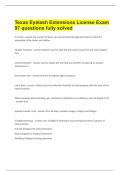
-
Texas Eyelash Extensions License Exam |97 questions fully solved
- Exam (elaborations) • 10 pages • 2023
- Available in package deal
-
- $15.49
- 1x sold
- + learn more
4 rounds the number of times you should comb through the lashes to check for separation of the lashes and stickies Straight Tweezers tweezers used to hold the side lashes away from the main isolated lash Curved Tweezers used to isolate the lash that you will then be placing on eyelash extensions on Non broken skin first line of defense against bacteria Loose Base a blunt end of an extension that fails to bond properly with the base of the natural eyelash W...
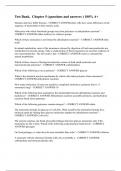
-
Test Bank, Chapter 5 (questions and answers ) 100% A+
- Exam (elaborations) • 8 pages • 2024
- Available in package deal
-
- $9.49
- 1x sold
- + learn more
Humans and mice differ because - CORRECT ANSWER-their cells have some differences in the sequence of nucleotides in their nucleic acids. Molecules with which functional groups may form polymers via dehydration reactions? - CORRECT ANSWER-either hydroxyl or carboxyl groups Which of these molecules is not formed by dehydration reactions? - CORRECT ANSWER-fatty acids In animal metabolism, most of the monomers released by digestion of food macromolecules are metabolized to provide energy. O...

How did he do that? By selling his study resources on Stuvia. Try it yourself! Discover all about earning on Stuvia


